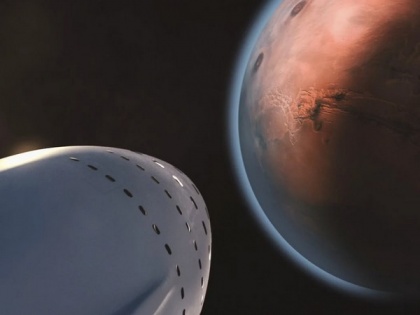Researchers discover largest known fresh meteorite strike on Mars
By ANI | Published: October 28, 2022 04:18 AM2022-10-28T04:18:21+5:302022-10-28T09:50:02+5:30
Since NASA's Mars Reconnaissance Orbiter began scouring the planet for them 16 years ago, Curtin University researchers have assisted ...

Researchers discover largest known fresh meteorite strike on Mars
Since NASA's Mars Reconnaissance Orbiter began scouring the planet for them 16 years ago, Curtin University researchers have assisted in the discovery of the largest fresh meteorite impact craters on Mars, one of which contained ice at the lowest altitude ever observed.
The two Curtin scientists were the only Australian representatives on a NASA-led international research team that helped make the rare discovery of two impact craters larger than 130 meters in diameter each that formed on Mars in the second half of 2021.
Associate Professor Katarina Miljkovic, from Curtin's Space Science and Technology Centre and the School of Earth and Planetary Sciences, said the craters were discovered using both NASA imaging technology and seismometers.
"As well as NASA's Mars Reconnaissance Orbiter imager, the NASA InSight seismometers were operating in the second half of 2021, which is when these impacts were recorded as having occurred," Associate Professor Miljkovic said.
"They have detected these impact events in the form of large seismic activity or a 'bang', firstly as the meteorite passed through the atmosphere and then again as it hit the ground.
"Impact events happen all the time on both Earth and Mars, but generally involve small rocks from space that only graze the atmosphere. On occasion, we get impacts that can penetrate deeper into the atmosphere to form a noticeable bang in the atmosphere or on the ground, which was the case here."
Because the meteorite impacts were large, they penetrated deeper into the planet, causing the only two quakes known to have been caused by meteorite impacts on Mars, according to co-author PhD student Andrea Raji, who completed the research while at Curtin's Space Science and Technology Centre.
"There are not that many large quakes detected on Mars, whether they be driven by interior geological forces or in this case external impacts, but when they do occur, they help with deep-interior mapping of Mars," Ms Rajsic said.
"Impact events are extremely helpful in seismology because they can be considered as a constrained seismic source with a known location. This is a fantastic way to peek into the interior structure of the Red Planet."
Associate Professor Miljkovic stated that one of the impacts excavated ice at the lowest altitude ever observed on Mars, which would help us understand the subsurface of Mars' water ice reservoir.
"This knowledge is useful for many reasons, from the potential future habitation of Mars by humans and their ability to locate water as a resource to the fundamental understanding of the structure of Mars as a planet. If we are to understand the formation and evolution of our own planet, we ought to understand other terrestrial planets too," Associate Professor Miljkovic said.
( With inputs from ANI )
Disclaimer: This post has been auto-published from an agency feed without any modifications to the text and has not been reviewed by an editor
Open in app